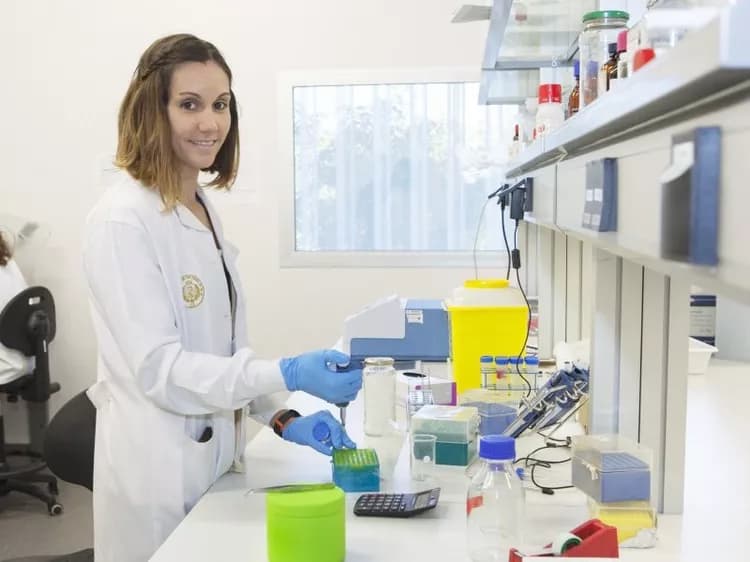A study led by researchers at Universitat Jaume I de Castellón has identified one of the genetic causes underlying the higher rate of melanoma in men. The results have been published in Biology of Sex Differences.
The Genetics of Skin Cancer and Human Pigmentation (Melanogen) research group, led by lecturer Conrado Martínez-Cadenas at the Universitat Jaume I de Castellón (UJI), has studied the differences between men and women in terms of pigmentation (eye, hair and skin) and sun response, i.e. history of sunburn, and the presence irregular moles and freckles caused by sun exposure. This study was carried out in collaboration with Dr. Gloria Ribas' research group at Incliva Biomedical Research Institute. It involved 1,057 people in total, some 52% of which were melanoma patients from hospitals in Castellón, Valencia, Madrid and Bilbao.
"The study included 384 genetic variants and six physical characteristics. The results show that, with the same genetic variability, men tend to have lighter skin pigmentation and a worse response to the effects of ultraviolet rays," Martínez-Cadenas tells us.
Estrogen enhances sun protection
Skin cancer is determined both by environmental factors, such as sun exposure, and other genetic factors. People with light skin or eyes and blonde or red hair have a 20 to 30 times greater chance of getting skin cancer that darker skinned people, who tan easily.
Meanwhile, several studies have shown that female hormones promote the production of melanin, the pigment that protects the skin from the sun. Indeed, "estrogen could be the reason why women have a darker skin tone, even when the genotypes of both sexes are the same, meaning that their risk of skin cancer is lower. So much so that skin cancer is much more prevalent in men," explains Bárbara Hernando, fellow researcher at the Melanogen research group and coauthor of the study.
This study on melanoma in Spain grew out of a previous study, where results "showed that men tend to have lighter eyes than women with the same genetic variety," Martínez-Cadenas adds.
Additional forensic uses
Research into the genetics of skin pigmentation is important for understanding human biology and evolution, as well as the biology of skin cancer. By identifying genetic factors that influence melanoma risk, we can study this kind of cancer in more detail. But beyond this, other studies carried out at the Melanogen group show that introducing the factor 'sex' in the eye colour prediction model developed for forensic purposes "significantly improves the success rate in identifying a suspect (or victim) from a biological sample found at a crime scene, for instance," Martínez-Cadenas explains.
Prevention is key to the fight against melanoma
The sheer number of factors involved in melanoma mean that treatments to cure it have not made much progress in recent years. Prevention is therefore the most effective weapon: "the best way to prevent melanoma is to limit exposure to the sun when UV radiation is at its peak, and to use sunscreen -at least factor 30- when outdoors" (Bárbara Hernando). Self-examination and regular visits to the specialist, especially if we detect irregular moles or freckles with uneven colouration, or which are larger than six millimetres in diameter, "are essential to preventing this disease," she concludes.
Three main lines of research are developed at the Melanogen research group at the Universitat Jaume I, led by Conrado Martínez-Cadenas. The first explores the genetic basis of human susceptibility to melanoma and other skin cancers. The second focuses on the molecular mechanisms and intracellular signalling pathways involved in the genesis and progression of skin cancer, both melanoma and non-melanoma (basal cell and squamous cell carcinomas). The third addresses the genetic, hormonal and environmental factors involved in the development of benign pigmented lesions: freckles, nevus, solar lentigo, melasma, etc.
The above post is reprinted from materials provided by Asociación RUVID. Note: Materials may be edited for content and length.
Disclaimer: DoveMed is not responsible for the adapted accuracy of news releases posted to DoveMed by contributing universities and institutions.
Primary Resource:
Hernando, B., Ibarrola-Villava, M., Fernandez, L. P., Peña-Chilet, M., Llorca-Cardeñosa, M., Oltra, S. S., ... & Ribas, G. (2016). Sex-specific genetic effects associated with pigmentation, sensitivity to sunlight, and melanoma in a population of Spanish origin. Biology of sex differences, 7(1), 1.
Related Articles
Test Your Knowledge
Asked by users
Related Centers
Related Specialties
Related Physicians
Related Procedures
Related Resources
Join DoveHubs
and connect with fellow professionals


0 Comments
Please log in to post a comment.